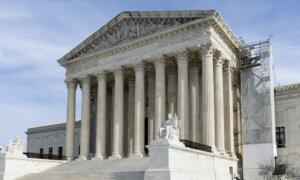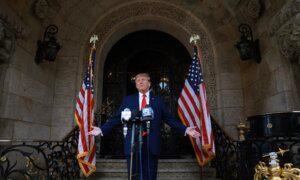Justice Sotomayor appeared to be the only one who was potentially interested in upholding the Colorado Supreme Court decision.
The U.S. Supreme Court is very likely to rule in favor of President Trump after the Feb. 8 oral argument over Colorado’s ballot disqualification, multiple experts indicated.
“Trump is almost certainly going to win,” former U.S. Attorney Neama Rahmani told The Epoch Times after oral argument.
“It’s just a question of how and [by] how much. I think the majority will find some procedural offramp to say Congress and not state officials should enforce the insurrection ban. They’re less likely to rule that the Capitol riots were not an insurrection or that Trump did not engage in it. Even the liberal justices were concerned about a single state barring a presidential candidate from appearing on the ballot, so they may join an opinion that overturns the Colorado ruling on procedural grounds. I expect a decision putting Trump back on the ballot in a matter of weeks.”
Heritage Foundation Vice President of the Institute for Constitutional Government John Malcolm similarly told The Epoch Times he expected an opinion “very soon, quite possibly by the end of the month.”
He said that although “predicting the outcome of any Supreme Court case based on the arguments is always a perilous undertaking, I think it is pretty clear that a majority of the Justices—quite possibly all of them—are going to overturn the Colorado Supreme Court and allow former President Trump to remain on the ballot in all 50 states plus the District of Columbia.”
“While the advocates for both sides got some tough questions, the hardest ones were directed to the advocates seeking to keep Trump off the ballot, and the Justices did not seem very satisfied with the answers. The Justices appeared very concerned about the possibility that different states could use different criteria and different standards to determine who should and who shouldn’t be on the ballot, especially when the thrust of the 14th Amendment appeared to give Congress the primary responsibility for making such determinations.”
Possible Outcomes
The Colorado Supreme Court ruled in December that President Trump couldn’t appear on the state’s primary ballot but included a potential stay pending action from the U.S. Supreme Court. President Trump is currently on the ballot but could be removed before the state’s primary on Super Tuesday (March 5) in the unlikely event the Supreme Court rules against him.
Oral argument and experts’ comments pointed towards the justices issuing a ruling that either focuses on President Trump not being an “officer of the United States” under Section 3 of the 14th Amendment, or requiring an act of Congress to precede lower courts’ enforcement of the section.
Whatever the outcome, it appears it will be either unanimous or an 8–1 decision with Justice Sonia Sotomayor dissenting. Her comments seemed to offer the most sympathy for the position of the disqualification advocates who originally brought the lawsuit. The other two liberal justices—Justices Elena Kagan and Ketanji Brown-Jackson—expressed concern about states having too much power in national elections.
“Only Justice Sotomayor’s vote appeared to be in question,” Committee for Justice President Curt Levey said in a statement obtained by The Epoch Times.
Reacting to the argument, George Washington University Law Professor Jonathan Turley suggested that it went worse for the disqualification advocates than they may have expected.
“The disqualification advocates may have expected a cold reception, but this was perfectly glacial,” he said on X, formerly known as Twitter. “Notably, some of the toughest and most skeptical questions came from the left of the Court.”
Justice Jackson had particularly critical comments about the idea that President Trump was an “officer of the United States” under Section 3.
‘Very High Stakes’
A decision on the “officer” language could be the best outcome for President Trump as it speaks directly to Section 3’s applicability rather than how it could be used to remove him from the ballot. If the justices rule that some kind of federal intervention is necessary, that would prolong the battle over ballot access and potentially foster civic unrest as Congress fights over related legislation.
“In today’s argument it looks like the Court is strongly leaning against the argument that Colorado has the authority to keep former President Trump off the ballot based on Section 3 of the 14th Amendment. Without doubt, Chief Justice Roberts will seek to ensure that the decision is unanimous our near-unanimous with the only possible dissents coming from Justice Sotomayor and—much less likely—Justice Jackson,” Pacific Legal Foundation Vice President Jim Burling told The Epoch Times.
He added: “The Chief Justice will probably write the decision himself and will work to minimize any resemblance of a fractured opinion with multiple concurrences. The last thing he wants is the sort of dissention that followed from Bush v. Gore. Based on the questions from two of the liberals—Justices Kagan and Jackson—it seems likely that he will be able to put out a uniform decision in which at least 8 justices join. He and the Court can then exhale a sigh of relief until the next politically charged case comes before it—which would be an appeal of the immunity decision earlier this week or the upcoming argument in the [Sarbanes-Oxley] prosecution of the January 6 rioters.”
Mr. Burling was referring to an appeal in which Jan. 6 defendants are asking the Court to strike the Justice Department’s relatively novel application of an evidence tampering law. The case is thought to potentially bear on President Trump’s District of Columbia case as he’s being charged under the same statute.
That case alone could result in two appeals before the Supreme Court; one on the gag order Judge Tanya Chutkan issued but was later pared down by the U.S. Court of Appeals for the D.C. Circuit. Another could come in response to the D.C. Circuit’s ruling that the doctrine of presidential immunity didn’t shield President Trump from prosecution in his D.C. trial.
Each of these appeals and some of President Trump’s trials touch on ambiguous areas of the law—all while the country heads towards what could be one of the most contentious presidential elections in American history.
Roberts Court’s ‘Biggest Test’ Yet?
A ruling against Trump, by contrast, could prompt angered conservatives to join calls for reform while casting doubt on the Court’s purported role in upholding constitutional democracy.
“I imagine Chief Justice Roberts feels pressure to maintain the credibility of the Court as an independent and apolitical institution, and I also imagine he is very reluctant to make a decision that removes a presidential candidate from the ballot,” University of Michigan Law Professor Barbara McQuade told The Epoch Times. Ms. McQuade, an appointee of former President Barack Obama, left the Justice Department along with a wave of attorneys asked to resign at the outset of the Trump administration.
“Working to reach some sort of consensus on the 14th Amendment case is going to be very difficult, in light of the different factions on the Court, but a 9–0 decision would provide the country with far more confidence than would a 6–3 decision,” she added. “The [Chief Justice] may need to engage in some serious horse trading to get there.”
Chief Justice John Roberts has generally been likened to a statesman who seeks moderation and compromise. In 2012, he notably upset conservatives by issuing a narrow ruling that the Affordable Care Act —known as Obamacare—was constitutional as a form of taxation.
Citing “judicial restraint,” he issued a concurring opinion upholding Mississippi’s 15-week abortion ban in 2022 but also criticized the majority for “altogether eliminating the abortion right first recognized in Roe.” He argued instead for a narrower decision.
According to The New York Times, Justice Roberts also sought to join former liberal Justice Stephen Breyer in writing an opinion. CNN also reported that he lobbied Justices Bret Kavanaugh and Barrett to avoid completely overturning Roe. The Times also reported that Justice Barrett considered switching her vote to grant certiorari on Mississippi’s law because she thought it was too soon given that she had just joined the Court.
Justices Barrett and Kavanaugh have also indicated an interest in more narrow rulings with their concurring opinion in Fulton v. City of Philadelphia. That case ultimately protected a religious adoption agency refusing to serve same-sex couples but also declined to overrule a precedent conservatives had long sought to remove from the Court’s jurisprudence.
Given the Colorado case’s high stakes, however, the chief justice may find greater sympathy for arriving at a unanimous decision.
Mr. Malcolm, who clerked for multiple judges and served as an assistant U.S. Attorney in Atlanta, told The Epoch Times that the Colorado case could be “the biggest test” yet for the Roberts Court.
“It is certainly the biggest presidential election law case to come before the Supreme Court since John Roberts became Chief Justice,” he said.
“Everybody who cares about politics and was around in 2000 remembers the Supreme Court’s decision in Bush v. Gore, an opinion which has its fans and its detractors. For many of the same reasons, this case will be remembered for a long time too, so in that sense it may be ‘the biggest test’ of the Roberts Court (and the Chief Justice obviously cares a lot about the reputation of the Court that bears his name). The stakes are high for the Court. It will be setting precedent in an important, but untested, area of the law.”
Original News Source Link – Epoch Times
Running For Office? Conservative Campaign Consulting – Election Day Strategies!


